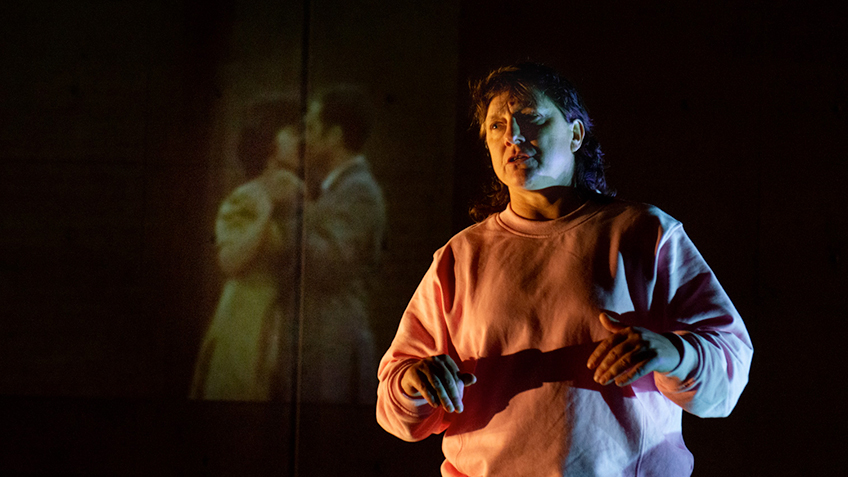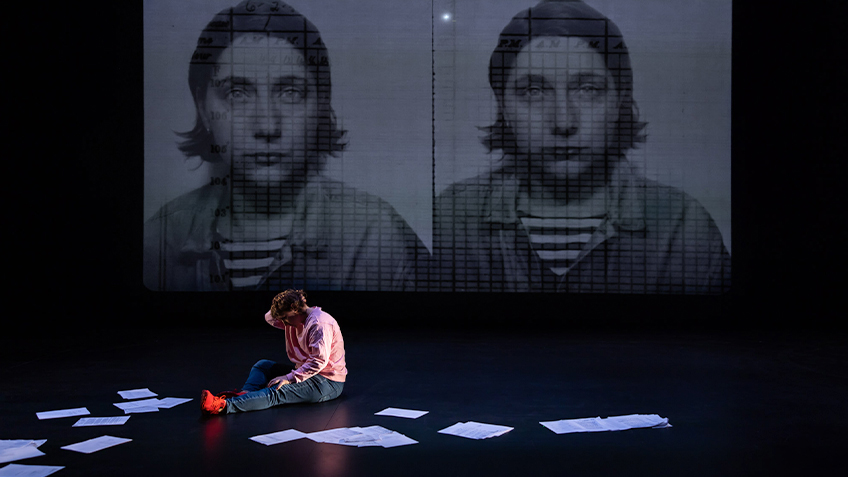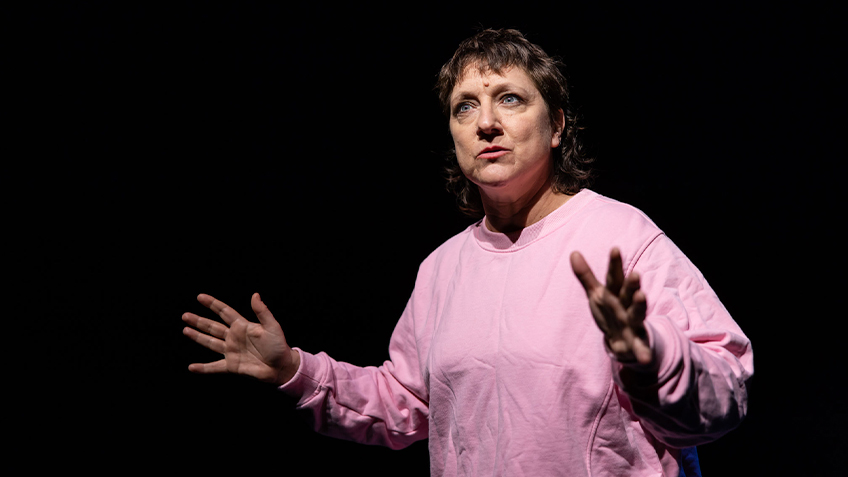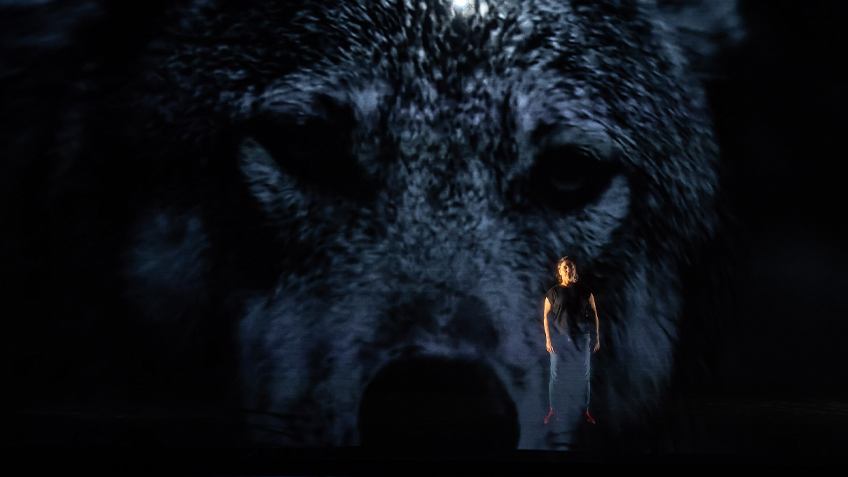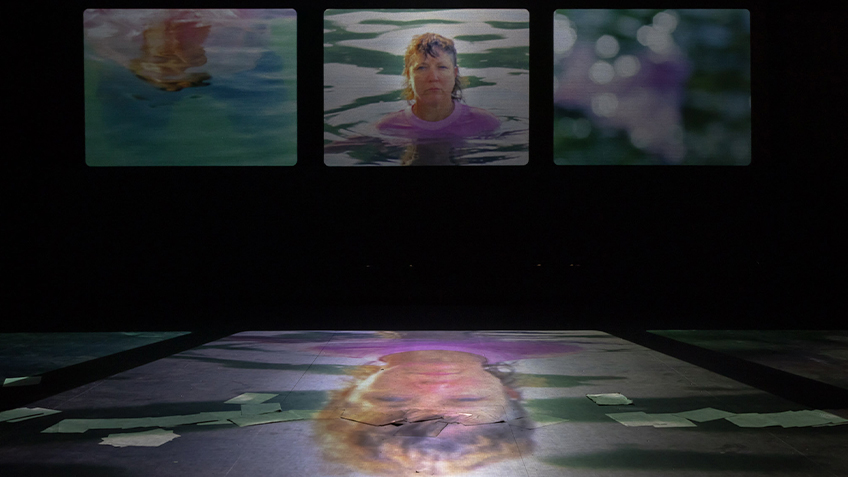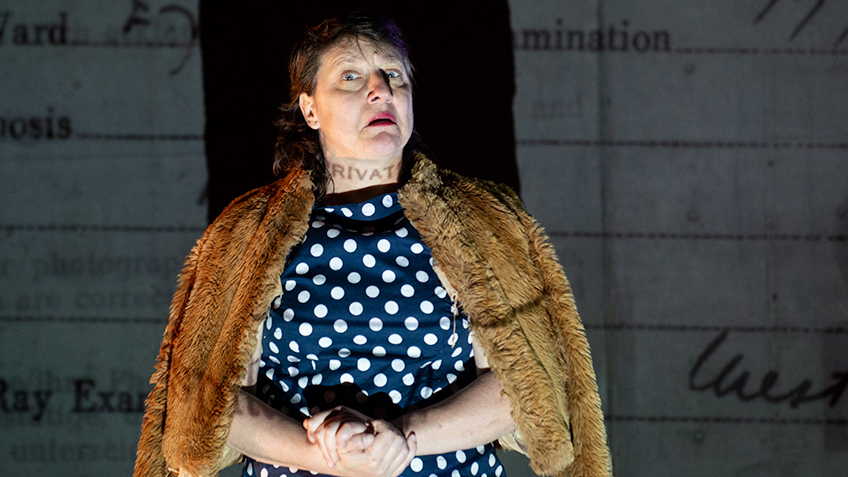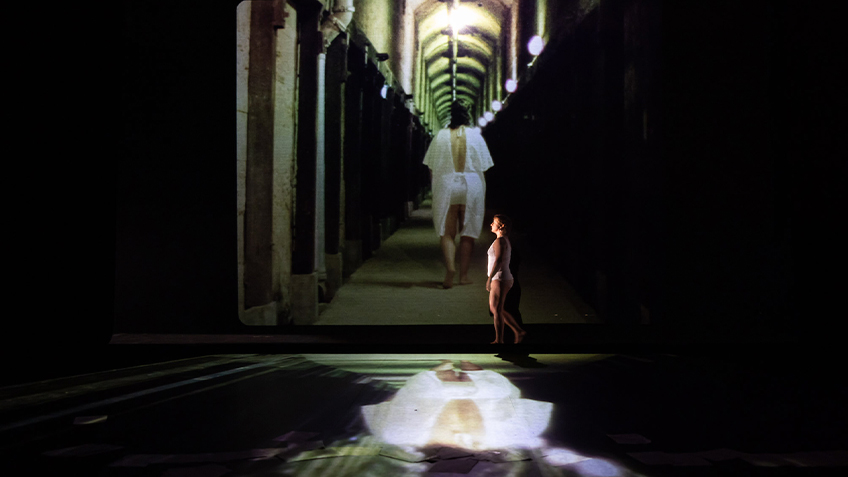The opening moments of Sleeplessness suggest something akin to a noir mystery; Kaz Therese emerges in a pink Sloppy Joe, accompanied by a pair of Red Nike Airs. Documents form an illuminated grid. There is a hazy quality to the atmosphere and the light here, as if we are between states of consciousness: an unwelcome disruption to a REM cycle. Therese strikes our attention as they begin moving around the space, attempting to (re)order these starched-white, formal documents through an intuitive, rhizomic formation. These are certainly not alike State-maintained archives; there is no clear path of navigation here…a feeling of where the fuck do we start?
As Kaz begins speaking, we realise this story is no Murder They Wrote, but the vivisection of a counter-archive (an unofficial one that is never complete, an ongoing fragment). One that has been sutured and Frankenstein’d together from the gaps, holes, and abscesses on the skin and hearts of three generations of a family. A sister, mother and grandmother damaged in various ways by the abuse and negligence of the State; of paternalistic mental institutions administering applied-pharmacology to the damage and detriment of patient’s bodies, glands and minds; of forced adoption and child-removal policies; of Catholic moral tyranny; of homelessness and going without – an unfolding triptych of a hopeless place permeating the alterior lives of the unknown and unknowable. Often referred to as a 20-year project, Sleeplessness spans incomplete stories such as these, across distorted and (a)synchronous lifelines – dancing on the margins of autobiographic, one-person theatre, but exceeding these descriptions for reasons made clear as the show progresses.
Despite the horrors that lurk, Sleeplessness still manages to carefully guide us through the desire paths of Kaz Therese’s memories and reflections, of their holes and jarred edges – poetically redolent of the neighbour’s windows Kaz smashed during their delinquent adolescence. Early on, we are told of a trip to Hungary and Budapest, where Kaz, in their early 30s, sought to find details about the life of their grandmother, Lenke Palffy: a Hungarian women, who was mysteriously buried as a ‘German man’ in a pauper’s grave in Emu Plains. The first incarnation of this work was developed not long after Kaz returned to Australia as part of their graduating project at VCA in 2000; a production that included a disarming, care-full score by Anna Liebzeit, with music by a Hungarian choir, elements of which are retained in the new 2022 performance. Indeed, this is a work that has lived alongside many lives. For, over the years, there have been several different versions anticipating this one, which is co-written and directed by Anthea Williams. In this sense, Sleeplessness is more than a performative retrospective, or mere dramatic archive; it is emergent mythology and culture (as silent life-spring) in the sequestered absence of both.
Considering these themes, Sleeplessness invokes other dramatic works by working and/or underclass playwrights. For instance, there are embodied resonances here with Australian writer Louis Nowra’s Cosi (1992): a semi-autobiographical play situated in a Melbourne mental institution in 1971. However, within the world of theatre, Sleeplessness is unique in that it presents a queering of the working-class aspirational narrative (this is certainly no Angela’s Ashes), arguably contributing to an emergent experimental tradition of queer-classed performance work, with parallels in Louise Wallwein’s solo-performance show Glue (2017); a story in equal parts deeply sad and humorous, exploring Wallwein’s personal experiences of being raised by nuns, which displaced her from her biological mother whom she didn’t meet until she was in her 30s.
Within both Therese and Wallwein’s work, queerness intersects with classness in a myriad of ways – a connection that is clear to those who’ve come into contact with the kinds of preclusive ‘moral’ proprietary enforced by the monied classes, whose electoral and political influence constitutes the bedrock of power in Western democracies, yielding influence over who gets to be counted as human. There are several moments within Sleeplessness that draw attention to such stigmatising cultural processes; one that sticks out occurs when Therese confesses they grew-up in housing-commission in Bidwill, Mount Druitt, before turning to the audience and asking what our associations are with this area (a significantly low-socioeconomic region in Western Sydney) before admonishing us to “well, stop thinking whatever you’re thinking”. We are subsequently disarmed by this humorous reproach, which disrupts the performance of middle-classness that middle-class spaces demand for entry and participation.
In the Melancholy of Class, Cynthia Cruz muses that working-class people risk becoming like spectres in middle-class worlds, due to the forms of assimilation that middle-class or institutional spaces require of people like us; not to mention the attendant psychic wounds that arise from the loss (or suppression) of working-class identity. In this respect, Cruz discusses how the performance of a particular class-identity beyond your own entails a type of social transformation. Ironically, Kaz often remarks that most people view them as a middle-class women named Karen, despite being non-binary and having grown-up as underclass, the daughter of a Forgotten Australian.
Throughout Sleeplessness, the notion of profound identity transformation is indexed by the many references to werewolves throughout the work – an obsession stemming from an experience of watching the 80s horror film, The Beast Must Die, with their father at age 6. After which the young Therese was left shocked and sleepless – terrified by the images of someone’s body violently transmogrifying against their will; an uncanny portent of the transformation’s attendant to coming-out as Queer, and of being thrown about by the vicissitudes of precarity. Kaz was kicked out of their family home at 14 due to reasons arising from homophobia – marking a disruptive juncture in the story of Sleeplessness.
The ‘wolf-in-the-wild’ also brings to mind one of the most poignant aspects of Sleeplessness: Kaz’s fragmented yet deeply-bound relationship with their sister Mel. At the midpoint of the show, we see an analogue photo of Mel (taken during her time at VCA) – a talented painter with a penchant for post-punk – who has been lost to addiction and homelessness, often missing for long periods, akin to cicada-like hibernation, non-locatable save a murmur here or there. For years, Kaz held their breath whenever they walked past a homeless person. As Mel’s image fades and is absorbed by a trebly guitar texture, we find ourselves experiencing a virtual loss of a sister ourselves … the space of no-space…forming a spectral transience reflected in the reverberated nostalgia of the opening chords from The Cure’s 1989 Lullaby – a song staple for melancholic, artsy working-class kids everywhere. The punch and affect of this assemblage of image and sound betrays those unspeakable psychic wounds. What does it mean to have parts of you that are invisible? Kaz yearningly asks towards the end of the performance.
Sleeplessness invokes many such questions around what it means to inhabit a traumatised and classed body. How can theatre and institutions be reworked and rewritten for these needs? These are persistent questions that the work is attempting to address through particular (in)formal devices – a means to redetermine the very structure of theatre as an alternative to a format, which is arguably engineered for the linear, teleological European patriarchal Master-narrative, underpinned by the cultural myth of having-it-together –an inherited format we still revere all too disproportionately to other modes of knowledge production.
To perform one’s disrupted lineage of subalternity against the received template, as Kaz does, demands an ethical under-working of performance – potentially leading towards a prescient, bodily-led process of feeling over form. For rather than surrendering to the professional dictates or traditions of this tendency to contort one’s voice, corporeality, and identity, Therese and director Anthea Williams have retrofitted drama to work for them. An approach made apparent when Kaz interludes: “[Stage Manager] Anastasia is gonna help me tell the story. They have my back. Anastasia will operate the show and when I don’t want to talk about something they will sort it out for me, because sometimes, I don’t know…” In both the rehearsal and opening performance, Kaz relied on Anastasia to take over the narration (with a voice recording) during the section about Mel’s disappearance – a portion of the story that discloses an eerie mimesis of their grandmother Lenke’s plight; a wound that has not and will probably never resolve.
Therese and Williams’ approach to restructuring the expected dramatic arc also reflects the frank reality that underclass stories are often (de)realised from the start by the depersonalisation of lack and loss, and of those who get left behind for reasons beyond our control. These experiences manifest in a lateral being-in-the-world – an internal feeling of non-linearity. Considering this, I am half-reminded of a phrase by the Expressionist painter Edward Munch, who once remarked that, throughout his life, he felt as if he were watching his life through a window. Trauma often induces an encompassing fog – a window through which we attempt to experience our lives as they unfold before and beyond us… It is this state of uncanny derealisation that permeates Sleeplessness particularly in the second half of the production…a recurring sense of being outside, or above your body… looking in…a floating just near the surface of something or someone else, always at risk of touching the threshold of the Real, but never really getting there.
However, despite the complex opacities of Kaz’s histories, Sleeplessness is also a story of revelation, wherein the essence of the past1 is painfully revealed via the unpacking of memories (archival, family, bodily) that form the hauntings that possesses and permeates Therese’s family, their life, and, by the end of the show, the audience. There is a redolence here of Mark Fisher’s conception of Derrida’s idea of hauntology, of lost, better worlds, that never arrive. Such a cultural idea has implications for those left in the purgatorial cycles of colonial legacies – particularly the people spoken about in Sleeplessness such as those whom we now refer to as Forgotten Australians (or Care Leavers), a term employed by the Australian Senate in its 2003–2004 Inquiry into Children in Institutional Care to refer to those 500 000 or so children and child migrants forcibly taken from their homes by paternalistic and ill-informed state policies. As Sleeplessness reveals, a cultural comatose still surrounds this issue today despite then Prime Minister Kevin Rudd’s 2009 public apology on behalf of the Australian nation; a reckoning that took place after strong advocacy from CLAN (Care Leavers Australasia Network), of which Kaz’s mum is a member and activist.
The fact that we haven’t dealt with these issues as a culture only amplifies the devastating and ongoing impact of the institutionalised violence and biopolitical hegemony attendant to our position as an administrative outpost of the Empire. It is an inescapable fact that the most vulnerable (the poor and the subaltern) are often the ones destroyed by the colony’s forces, its interventions, carceral mandates, and surveillances. These implications are devastatingly examined when Kaz re-performs their own grandmother at the locations and interactions revealed by the archival information uncovered through their research – accompanied by video reenactments that were filmed throughout Hungary during Kaz’s initial trip; here we are disarmed by a projected image of Kaz as Lenke, in a polka-dot dress walking by a train station, holding a baby.
Through these flashback scenes, we get a glimpse of Lenke, a talented, sublimely beautiful, and intelligent women who was a skilled couturier – abandoned by the father of her child and damaged by the war – who migrated to Australia for a better life; only to subsist within a migrant hut amidst the violence of the patriarchal systems. Later, we see the gradual state-sanctioned dispossession of her mind and body as Kaz channels her again, this time during the period of breakdown. Kaz, again in the same polka-dot dress, but frantic this time, speaking in Hungarian and ventriloquising their Grandmother’s voice after a traumatic event – we experience a flashback to a cruel police report, decrying the distressed Lenke as ‘foolish in manner’ suffering from insomnia – a diagnosis that would later lead to her being sectioned in Parramatta Mental Hospital. The most harrowing scenes unfold here wherein Kaz conjures their grandmother in a hospital gown – another possession of the poltergeists of mental illness and severe medicinal side effects (poorly understood at the time, or just ignored). These medications inevitably damaged Lenke’s pituitary gland and body. She died in the mid 80’s stripped of her original identity and gender, unbeknownst to Kaz and their mother, long before the story of Sleeplessness ever began. Her grave was located only a few kilometres away from their family home.
Lenke is not the only family member that Kaz performs in this work. At a moment of lightness, Kaz reflects on a past attempt to channel their mother as part of an abandoned art project that ‘didn’t really work’– a depiction of their mum winning the lottery in front of an abandoned supermarket in Mount Druitt; or sitting on the beach as if in a Mills and Boon novel. This becoming-other, of both mother and grandmother is not a form of transcendence, or mere transfiguration, but a bodily way of getting closer to that which one cannot explain verbally – or even perhaps a necessary and cathartic exorcism of those we never got a chance to truly know.
Across uniquely devised modes of (re) performance, Sleeplessness is a radically empathetic and confessional story of a family attempting to live within the severity of the gaps and interventions of the State. Having come back from the brink of multiple traumas, Kaz presents us with a bold inversion of the silencing attendant to living in a world just not made for you and your own, unpacking the costly ramifications of violent normalisation processes; gender, and classed invisibility; and the damaging legacies of institutions. By the end of the show, we realise this is no longer someone sleepwalking through the rubble, remains and decay, but an advocate (like their mother) who has found the affirmative way through the mire time and time again. Kaz’s resolve that ends the show is the doubly defiant and vulnerable phrase: “I am here”. With this final declaration, there is no emphasis on triumphant accolades or the spectacle of ‘success’ stories; merely one where survival is fucking enough – heralding a now-or-never call to acknowledge those things have gone so wrong with Australian society before we find ourselves both somnambulant and on fire at the same time.
Sleeplessness played at Carriageworks from 4-13 Aug, 2022.
[1.] Marcel Proust employed this phrase to refer to the uncovered truths that can be unearthed by the process of ‘involuntary memory’: a form of spontaneous memory retrieval triggered by evocative stimuli, such as images, objects, odours, etc.
